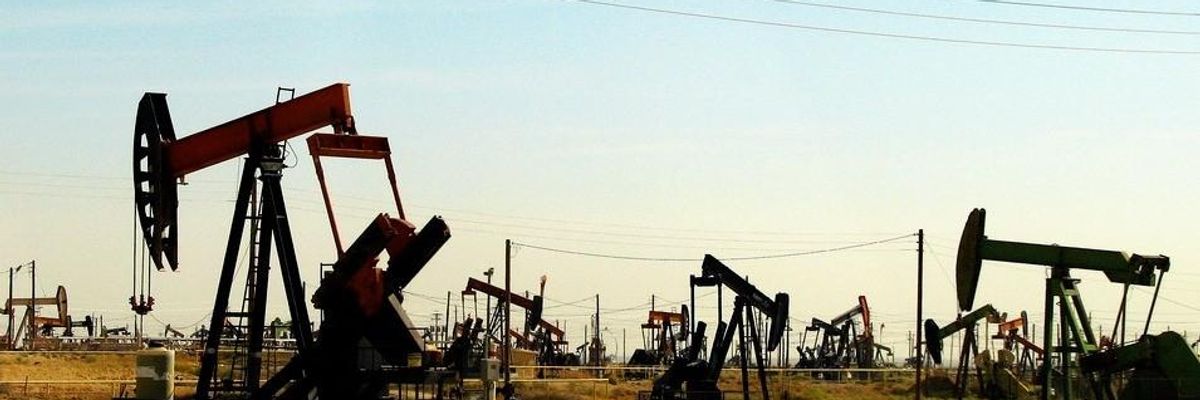While campaigners around the world continue to demand a just, green recovery from the ongoing coronavirus pandemic, new data from a global Energy Policy Tracker shows that the richest countries on Earth have committed billions of dollars in public money to support fossil fuels since the start of the public health crisis.
The new tracker reveals that G20 countries, who account for 80% of the world's greenhouse gas emissions, have committed at least $150.81 billion to support fossil fuel energy while only $88.63 to support clean energy. The tracker was launched ahead of G20 meetings of finance ministers and central bank governors and deputies this weekend.
Though the fossil fuel industry was already struggling financially prior to the pandemic--and scientists continue to warn that transitioning to renewable energy is essential to ensure a future habitable planet--only about a fifth of the G20 money for coal, gas, and oil is conditional on environmental requirements such as reducing planet-heating emissions.
"The Covid-19 crisis and governments' responses to it are intensifying the trends that existed before the pandemic struck," Ivetta Gerasimchuk, an Energy Policy Tracker project lead and International Institute for Sustainable Development (IISD) expert, said in a statement Wednesday.
The United States has committed the most stimulus money of any G20 nation to fossil fuels without any conditions--$58.12 billion--compared with $25.1 billion for clean energy. Behind the U.S. on both fronts is Germany, albeit with its $12.5 billion committed unconditionally to fossil fuels doubled by the $24.88 billion committed to conditional funding for clean energy.
The G20 is made up of the European Union and 19 countries. Other member nations that have committed billions to clean, dirty or other energy during the pandemic include France, India, China, the United Kingdom, Canada, Indonesia, South Korea, Brazil, Italy, Mexico, and Turkey. Australia, Russia, South Africa, and Saudi Arabia have each committed millions to the fossil fuel industry.
"National and subnational jurisdictions that heavily subsidized the production and consumption of fossil fuels in previous years have once again thrown lifelines to oil, gas, coal, and fossil fuel-powered electricity," Gerasimchuk said. "Meanwhile, economies that had already begun a transition to clean energy are now using stimulus and recovery packages to make this happen even faster."
The tracker is a project of IISD, the Institute for Global Environmental Strategies (IGES), Oil Change International (OCI), Overseas Development Institute (ODI), Stockholm Environment Institute (SEI), Columbia University's School of International and Public Affairs (SIPA), and other partner organizations.
Elisa Arond, a research fellow at SEI, told the Guardian that "today, governments are doubling down on fossil fuels as they grapple with the pandemic and plans their recoveries, but there is still time to build back better," referencing global calls from campaigners to incorporate environmental and climate policies in economic recovery plans necessitated by the pandemic.
In a joint statement Wednesday responding to the new tracking data, activists around the world reiterated those demands, urging governments to focus on funding clean energy rather than propping up polluters.
"At this point in history it's clear that investing in fossil fuels is as lethal to global economies as it is to life on Earth," said Catherine Abreu, executive director of Climate Action Network (CAN) Canada. "Yet G20 leaders keep lying to themselves and their citizens as they prop up coal, oil, and gas with public money in the name of private financial return."
"Canada's claims to international leadership are hollow as long as its national and subnational governments funnel money to polluting projects like Vista and the Trans Mountain and Coastal Gaslink pipelines," Abreu added. "Covid-19 has revealed two truths that Canada and G20 leaders must heed: one, if we don't kill pollution, it will kill us; and two, a healthier world is possible--we need to only choose to build it."
Noting that Bangladesh is "extremely vulnerable to climate impacts" including destructive extreme weather, local Fridays for Future member Sohanur Rahman called on rich G20 countries "to cease supporting coal and invest instead in renewable energy that will allow Bangladesh to establish itself as a low-emission country, to protect our people and our future from the effects of the climate crisis."
"Covid-19 has revealed two truths that Canada and G20 leaders must heed: one, if we don't kill pollution, it will kill us; and two, a healthier world is possible--we need to only choose to build it."
--Catherine Abreu, CAN Canada
Rahman explained that Bangladesh is set to build 29 coal plants, and while "Chinese investments represent the majority of the proposed coal power capacity," companies based in Japan and the U.K. are also involved in multiple coal projects in the country.
Daniel Ribeiro of Justica Ambiental (Friends of the Earth Mozambique) called out the fossil fuel financiers and transnational corporations from G20 countries that are "ravaging the Cabo Delgado province of Mozambique."
"The gas rush has already been fueling human rights abuses, poverty, militarization, corruption, violence, social injustice, and environmental destruction," said Ribeiro. "In addition, climate science shows us clearly that gas cannot be an option for the future of our planet."
Ilan Zugman, interim director of 350.org Latin America, argued that governments in the region "will be throwing money away if they continue to support the fossil fuel industry through credit, subsidies, or bailouts."
"In countries such as Argentina and Mexico, fostering community-led, renewable energy will clearly result in better outcomes for the economy, the climate, and the most vulnerable communities," Zugman said. "In the last few months, we have seen huge oil spills in rivers of Ecuador and coastal areas of Brazil, which harmed thousands of Indigenous and fishers. Choosing between such a dirty sector and industries that will create clean jobs amid a recession should be a no-brainer."




